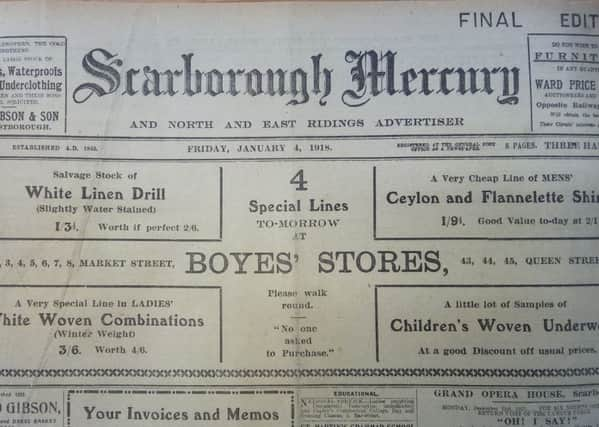1918 crimes: Stables owner should have said neigh to hay


Mr J Whitfield appeared for defendant, who pleaded not guilty.
The Chief Constable said PC Berryman of the NE police saw a number of wagons with hay. He also saw a truss of hay underneath the wagon.
Advertisement
Hide AdAdvertisement
Hide AdHe kept observation for about three-quarters of an hour, and he saw Clifford come along with a horse and lorry, and two youths followed with another lorry belonging to Clifford. Berryman saw Clifford assist the youths to load one of the trusses of hay on the lorry.
PC Berryman spoke to Clifford, and the matter was reported to the police. When Detective Sergeant Yeoman saw Clifford, defendant said: “I got it from a soldier. I gave him 1s for it. I can point the soldier out to you, but I do not know his name.”
Enquiries were then made, and at Clifford’s stable they found another truss of hay, and some loose hay, about half a truss.
The soldier was found to be Private John James Ashton, ASC, and he said: “We were loading a wagon of hay, and we have a truss of ‘dunnage’ (ie trimming). I told Clifford he could have it if he liked for his horse. Whenever we have any dunnage left we leave it, anyone can have it. Clifford gave me a shilling for a drink. I did not sell the dunnage.
Advertisement
Hide AdAdvertisement
Hide AdThe Chief Constable added that the military valued the hay as dunnage at 3s 9d.
Evidence was given by PC Berryman, Detective Sergeant Yeoman, Private John James Ashton, and Lieutenant HA Jones, ASC.
In reply to Mr Whitfield, PC Berryman said there were a good many people about when Clifford moved the hay.
Private Ashton said he had no authority to dispose of this “dunnage”. He never sold any dunnage. He gave Clifford it. Sometimes porters took an armful away and sometimes, if it was not moved, it got wet and was spoilt.
Advertisement
Hide AdAdvertisement
Hide AdThe witness added that when Clifford gave him a shilling for a drink he gave 6d of it to another soldier.
By Mr Whitfield: The hay was “foisty” and unfit for horses.
Lieut HA Jones, said a private soldier had no authority to dispose of dunnage.
If there was any surplus it had to be taken on to the next station or returned to the farmer.
Advertisement
Hide AdAdvertisement
Hide AdMr Whitfield was about to call Clifford when the magistrates pointed out that they were quite satisfied that the hay was not of great value. Clifford’s admissions were not disputed.
Thereupon Mr Whitfield did not call defendant and he proceeded to address the court. He pointed out that the soldier had acted in ignorance. The damage was of no great value - it was abandoned. If the property had been abandoned it ceased to be the property of the army and ceased to be regimental stores. If any offence had been committed it was only of a technical character.
Both defendant and the solicitor acted perfectly bona fide. The Mayor said the magistrates considered it a serious matter although the value was small.
The practice of dealings between members of His Majesty’s forces and civilians with property which belonged to the War Office was in the last degree reprehensible.
Advertisement
Hide AdAdvertisement
Hide AdClifford knew that the hay was worth something. Everybody who had to do with horses knew perfectly well there was a regular famine of hay and even if it could not be used for eating purposes it could take the place of straw.
It was a dishonest practice to accept property belonging to the nation and it did not matter whether the Army methods were slack or not. A fine of £2 would be imposed.